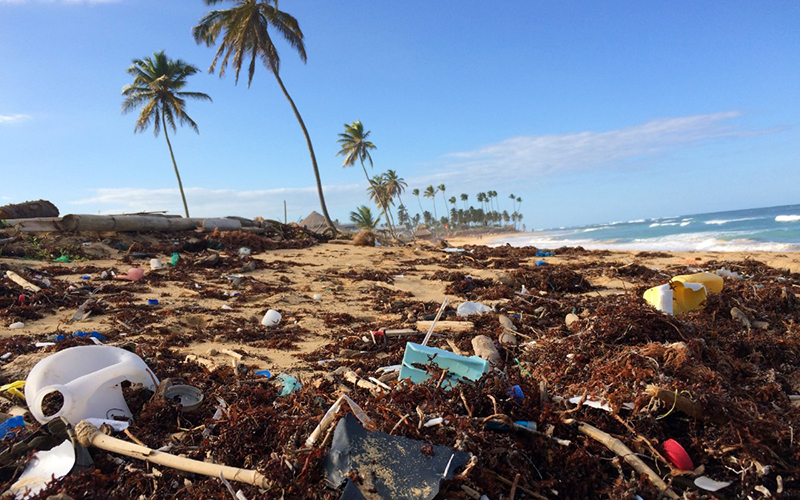In the Pacific, Covid-19 is changing the way we think about waste management
The pandemic is producing more household waste and increased amounts of dangerous medical waste. We need to manage these changes for our immediate safety and for the long-term welfare of our communities.
The Covid-19 pandemic requires that we think differently about waste management, including the way we dispose of medical waste. Recent stay-at-home orders and social distancing have increased the amount of household waste being produced. If the waste management industry is unable to keep pace, Covid-19 could set back our efforts to reduce and eliminate single-use plastics and recycling waste.
| Waste management is particularly important in fragile island communities. Photo: Dustan Woodhouse |
In the Pacific, where communities often live on remote islands with minimal resources, stay-at-home orders and social distancing measures are also prevalent. However, because supply chains and home delivery systems for groceries are limited, many people visit markets for food. Municipalities coordinate the collection of solid and municipal waste collection with the help of local private sector partners such as beverage and bottling companies.
Health facilities are responsible for sorting, treating and disposing of medical waste; however, many continue to face logistical, financial and capacity challenges in overall waste management. Institutions, such as the Pacific Region Environment Programme, are working with development partners to strengthen existing medical waste management protocols in the region through investments in health facility infrastructure, training and capacity building of healthcare workers, and equipment for proper handling and disposal of waste.
During Covid-19, while medical waste management continues to be an important area for support, routine household municipal waste collection is also essential to maintain a sanitary and safe environment. With the recent onset of Tropical Cyclone Harold, timely collection and disposal of debris is critical to maintain a healthy environment.
In addition to the dual challenges created by Covid-19 and natural hazards, it remains equally important to integrate the disease into existing and future waste management and recycling initiatives. Some of these initiatives, which are relevant to the Pacific and other in low-resource settings, include:
Increase awareness by educating households on disposal of plastic gloves and masks. Just like syringes, these items need proper handling and disposal for two reasons—items cannot be recycled with other plastics, and the risk of contamination should be minimized by waste collectors handling waste in the formal or informal sectors. A study by The New England Journal of Medicine found that the virus could remain viable and infectious on surfaces, such as cardboard, plastics and steel, for more than 24 hours.
Package municipal waste properly. Regardless of whether your household waste goes in a bin or down a trash compactor, disposing of waste properly is in everyone’s interest (i.e., by placing it in a bag and securing it tightly). Our health and environment depend on it. Recent articles have mentioned the displacement of rodents due to a lack of food waste from closed restaurants. An unsafe and unsanitary environment could lead to other potential diseases, including those transmitted by rats such as salmonella and e. coli.
Protect frontline workers who collect, transport and manage waste. Personal protective equipment or gear (PPE), and regular sanitization of vehicles and equipment is required. In India, people celebrate neighborhood sanitation workers with garlands made from monetary notes (in Punjab) and flower petals (in Ambala). If frontline workers get sick, our trash will not get picked up. This is an essential service.
Develop preparedness and response plans. The preparedness plans of utilities, municipalities and urban service companies must develop their emergency preparedness and response plans. Part of the plan should include the health of their workforce. Access to PPE is one thing. Others may include planning for multiple staffing shifts and providing shelter and meals for field workers.
Recycle, recycle, recycle. Manufacturers have shared the need for recovered material feedstock through several testimonials—recycling is important for manufacturing, the economy and the environment. The principles of minimizing, sorting, reusing and recycling are important. Recycling programs provide essential services yet are in danger of closure due reduced workforce, budgetary concerns, increased disease and hygiene fears, and potentially lower oil prices. It is imperative to keep the waste and recycling facilities operational. This includes continuing efforts to reduce single-use plastics.
Increase awareness by educating households on washing of reusable bags. What appears to be common sense, is not. A 2011 study by the University of Arizona and the Loma Linda University School of Public Health found that reusable tote bags harbor bacteria and viruses, including fecal coliform bacteria. The study emphasized the importance of educating consumers on proper care of reusable bags. A tote bag is still more environmentally friendly as it can be washed to be re-used and to reduce bacteria by more than 99.9%.
Break down silos: Collaborate with health, energy and private sector infrastructure investment specialists. Work to build and strengthen medical waste management and prepare pandemic protocols. Medical waste management should not be delinked from an overall health system strengthening approach and disposal managed through a resilient sanitation system. Opportunities for modernizing medical waste capacity should also be explored. For instance, outdated facilities such as on-site incinerators can be modernized to avoid the emission of toxic gases and generate clean energy from waste (e.g., plasma gasification).
While social distancing and fear could derail recycling and proper waste management efforts, there are ways to remain diligent and stay the course. Whatever the new normal will look like, livable cities must be clean cities—we must continue to promote proper waste disposal and management to reduce pressures on existing landfill capacity and protect our marine life.
Once Covid-19 is long gone, we will still want our cities and oceans to be safe, healthy, sanitary and livable.
Anupma Jain is Senior Urban Development Specialist, Pacific Department, ADB.












